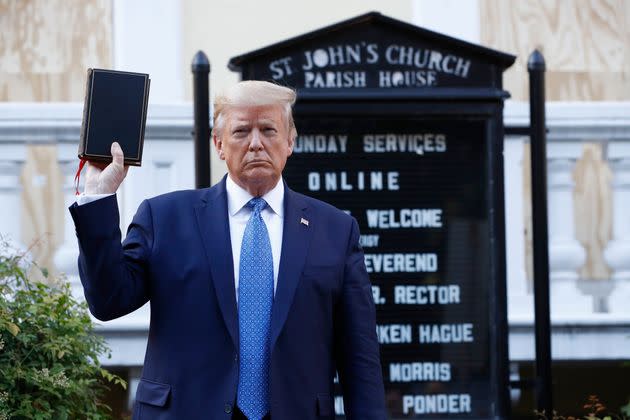In The Book Of Trump, All Politics Is Ego

A friend of mine asked of Donald Trump voters: “How can they support such a sniveling, weak, low-IQ, whiny, bitch-ass snowflake? How does a corrupt liar charged with 88 felonies in four indictments and found liable for sexual assault even have a chance to win in 2024?”
There may be an answer to his question.
Manywritershaveargued that politics is the new religion in America.
It’s an easy conclusion to reach. Maybe too easy.
Over the past three decades, religious affiliation and church membership have fallen dramatically, from a relatively constant 70% through most of the 20th century to less than 50% today.
And this has happened as ideological zealotry has intensified, even taking precedence over religion.
“Today, religious Americans tend to choose their congregation with an eye toward partisanship,” The Christian Science Monitor noted, “to the point where the choice of presidential candidate can lead a voter to move to a new church.”
Not that long ago, you would have been hard-pressed to find anyone putting politics over religion. In the 1960 presidential election, John F. Kennedy faced significant anti-Catholic prejudice. Many feared the pope would have undue influence in the nation’s affairs if we had a Roman Catholic in the White House.
Back then, faith was a primary way people identified themselves and sized up others. It was how we assessed whether you were “one of us” or “one of them.”
For a long time, religious faith could even be a deal-breaker, especially for a marriage. A Baptist, for instance, could never marry a Methodist. Where I grew up, it was almost unheard of for a Catholic person to marry a Jew, something illustrated in a scene from the Martin Scorsese film “Goodfellas.”
Today, however, the biggestdeal-breaker for a potentialmatchis politics. In recentpolls, participants overwhelmingly say they find it tougher to date someone with political views different from their own.
And we’ve all heard stories of how national politics has fractured families and friendships. (Imagine if that were your political legacy: ruining family ties and friendships throughout the entire country you claim to love.)
What I see here isn’t a national divide over politics, let alone religion; it’s a divide over personal identity.
Philosophers, psychologists, psychiatrists and sociologists have longpondered the universal human need for a unique identity. For many, religion was once that go-to marker. Now it’s politics. Politics isn’t the new religion. It’s the new identity.
I don’t think it’s an accident. I think it’s a replacement. Certainly not for all of us but for a sizable number — and, dare I suggest, a number that falls in a particular political camp. Their dedication to this identity is beyond passionate; it’s pathological. It borders on dogmatic fanaticism that is almost overtly religious. It’s why they get their backs up when someone attacks their politics or a figure who represents their politics. It’s not their politics that’s being attacked; it’s the identity, and they take it personally. That might explain our increasingly coarse national discourse, to the point where publicly cursing or threatening an opponent’s family are practically the norm.
Where some say certain people are prone to anger, rage, and hostility, I say those people have become defensive. They’ve invested so heavily in their political identity that they have to protect it at all costs and can’t — won’t — back down. If they did, it would be an admission that they were wrong, that everything they believed and everything they invested themselves in was a sham, crumbling like a Jenga puzzle.
Imagine if, magically, a time machine could bring Jesus Christ to the present day only to concede, ”Ya know what? I was a lousy carpenter and I needed to make a living, so I came up with a good line of bullshit. It worked.”
What would believers say? I think you know. They’d call him a false prophet, not the real thing. They couldn’t possibly accept that everything they believe, every fiber of who they are, was based on a lie.
Imagine Trump having, instead of a rally, a confessional, where he told his loyal followers, “Ya know what? It’s all a con. I lied about everything. I just wanted to be president, have power and be worshipped.”
How would the base react?
It’s more accurate to call it a fan base, like die-hard sports fans. You know the type I mean? The ones who watch a game and shout, “We gotta win this one!”
What do you mean “we”? What are you, on their payroll? Are you an employee? There ain’t no “we.”
But it’s a way to establish an identity. We are who we support, who we worship.
That is our politics. It’s not about partisanship. It’s about our ego, our self-esteem, our ID.
It’s a fascinating correlation, this passing of ships between religion and politics. I find it ironic, however, how onetime religious congregants taught to fully submit to the mysterious will of a single authority, according to an infallible Word, are so susceptible to the self-serving proclamations of a charismatic sociopath.
I’m not so sure it’s ignorance, or even willful ignorance. Whichever it is, those who would benefit from it have effectively cultivated, shaped, and exploited that ignorance for their own gain.
Indeed, we might better call it an unwitting ignorance, an unwitting suffocation of one’s own brain cells with television, social media and Golden Calf demagogues.
And just like religion, they hang on to it for dear life. They belong to what is good and righteous. They’re never wrong about their beliefs or their faith in their deity— in this case, Trump. Those who disagree are evil and must be banished.
Let us hope we don’t see a resurrection of Donald Trump come November.

